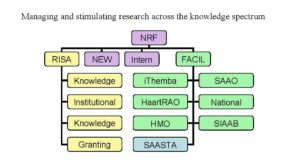The Vrije Universiteit And South Africa ~ Stimulating Research Future
 The wealth of Africa
The wealth of Africa
Wealth producing innovation does not occur in a vacuum.
Technological breakthroughs do not automatically lead to increased wealth. More wealth does not lead to a better society.
Research for a better life
The benefication of research into wealth requires
– Skilled people;
– And ideas;
– That translate into novel practices;
– Organisations;
– And products
In other words, it takes social innovation to make wealth through research and it takes research to make innovation in the 21st century.
The NRF – A South African national mandate in an African context
Support and promote research
– through funding, human resource development and the provision of the necessary research facilities
To facilitate
– the creation of knowledge, innovation and development in all fields of science and technology, including indigenous knowledge.
In order
– to contribute to the improvement of the quality of life of all the people of the Republic
Managing and stimulating research across the knowledge spectrum
 Strategic priorities
Strategic priorities
– High quality research;
– Equity and redress;
– Internationalisation of research;
– Focus on Africa;
– Positioning the NRF within the NSI;
– Organisational transformation.
PhDs as the driver
Strategy requires multiple interventions at different nodes along the Higher Education and National Innovation system.
The key driver for the NRF is the production of PhDs
– In sufficient quantities;
– Of sufficient quality;
– Across the knowledge spectrum;
– In order to create an innovative and entrepreneurial knowledge society.
The challenge is
– To efficiently feed and create high levels of knowledge resource;
– To offer graduates visible, meaningful career paths;
– To translate the benefits of sustained Higher Education into people able to produce or use new knowledge to meet challenges of democratic development.
Social Science, Law and Humanities = The Significant Other
– Requirement for creating a democratic, culturally informed and innovative society (social);
– Awaken new directions in scholarship (social);
– Create a platform for understanding and building teh interface between and across knowledge systems (systemic);
– Present the need for research in humanities in the NSI (policy).
NRF-driven SSLH initiatives
– Shifting boundaries of knowledge;
– Developing the study of science as a research field;
– Introduction of SSLH into Large Science Platforms – African Coelacanth;
– Stimulation of Science and Society.
Shifting boundaries – first draft themes
– Theories of knowledge;
– Theories and knowledge;
– Social functioning a.k.a. development;
– Globalisation and community;
– Social structure – race, class and gender.
Approach to international partnerships
Purpose is to build
– Research links;
– Individual and institutional capacity;
– Networks and partnerships.
In a way that is enduring and self-sustaining.
Compelling arguments
– Expertise;
– Performance;
– Relevance;
– Intellectual leadership;
– Social accountability;
– Prospective thinking.
Compelling engagement
– Direct institution to institution linkages for SA capacity building;
– System to system dialogue and exchanges;
– Scholarships;
– Research partnerships;
– Access to EU Framework Programmes;
– Active public scholarship.
Note: This contribution is the unadapted text from a Powerpoint presentation.